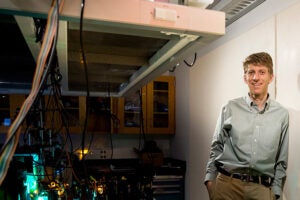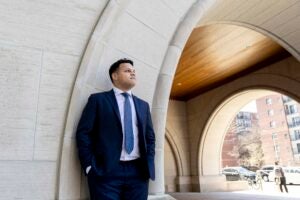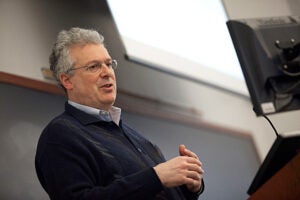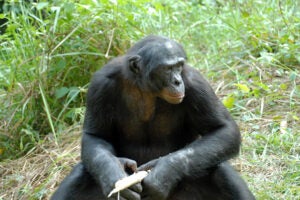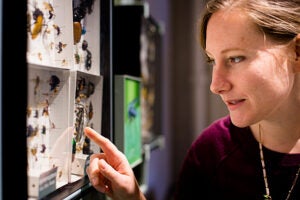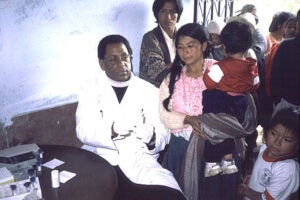Tag: Reuell
-
Health
Mystery motor
Harvard researchers have solved the mystery of how some bacteria move across surfaces with the discovery of a rotary motor in the bacterium Flavobacterium johnsoniae.
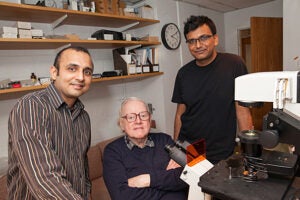
-
Health
Hip correction
A new study finds no connection between hip width and efficient locomotion, and suggests that scientists have long approached the problem in the wrong way.
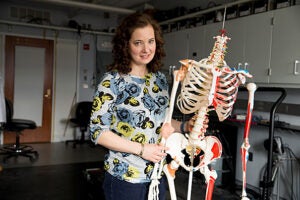
-
Science & Tech
Understanding common knowledge
A new study examines how different kinds of shared beliefs can affect how people cooperate, and how people use common knowledge, a type of shared understanding, to coordinate their actions.
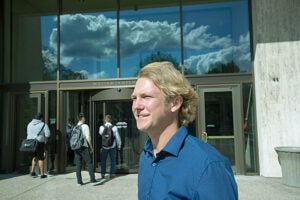
-
Campus & Community
A distinctive honor
Sixty-three Faculty of Arts and Sciences (FAS) employees from 36 departments — representing 2.5 percent of the FAS staff — were recognized at the sixth annual awards ceremony and reception, held in the faculty room of University Hall.
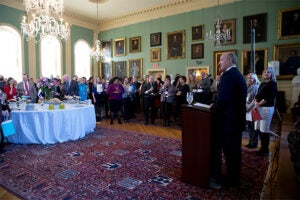
-
Health
The teeth tell a tale
A new study shows that the teeth of early hominins grew unlike those of either modern humans or apes, suggesting that neither can serve as a useful proxy for estimating the age or developmental progression of juvenile fossils.
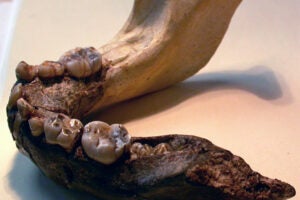
-
Campus & Community
Crowd of Fulbrights
For the second year in a row, Harvard is the leading producer of Fulbright Scholars, with 34 students ― 22 from the College, 12 in total from the Graduate School of Arts and Sciences, Harvard Law School, Graduate School of Design, and Graduate School of Education — receiving the prestigious grants.
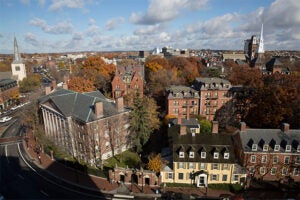
-
Health
March mammal madness
An assistant professor of evolutionary biology, Katie Hinde is also the creator of Mammal March Madness, a tournament that emulates the college basketball playoffs and pits species against each other in simulated combat.

-
Health
A new understanding of Alzheimer’s
Using the principle of natural selection, researchers have outlined a new model of the disease suggesting that mitochondria — power plants for cells — might be at its center.
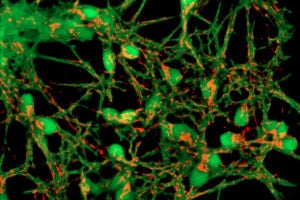
-
Science & Tech
Playing the ‘envelope game’
Harvard researchers have developed a first-of-its-kind model, dubbed the “envelope game,” that can help researchers to understand not only why humans evolved to be cooperative but why people evolved to cooperate in a principled way.
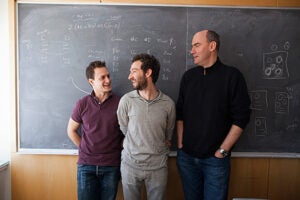
-
Health
Walk like a man
The fossilized hipbone of an ape called Sivapithecus is raising a host of new questions about whether the upright body plan of apes may have evolved multiple times.
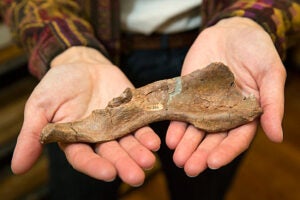
-
Campus & Community
Exploration, transformation
The fifth annual Harvard College Wintersession featured a host of events, from print-making on clay tablets to yoga classes to programming featuring prominent alumni.
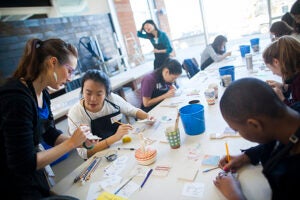
-
Campus & Community
Beyond the lab and library
For the past seven years, January has been a time when students in Harvard’s Graduate School of Arts and Sciences can delve into topics they might not otherwise have the chance to explore — everything from the mating habits of insects to writing grant proposals to various imaging techniques.
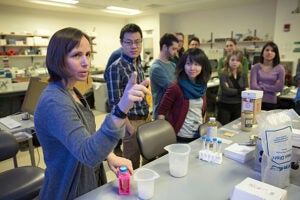
-
Health
Sounding out speech
A new study demonstrates that infants as young as 6 months can solve the invariance problem in speech perception.

-
Health
How mosquitoes home in
A team of researchers has identified a key genetic variation that helps mosquitoes “smell” humans. The study could open the door to new strategies to ward off the pests.
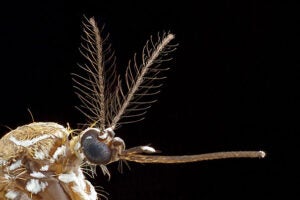
-
Campus & Community
A lifetime of scholarship, recognized
Steven Shapin, the Franklin L. Ford Research Professor in the History of Science, whose scholarship has had a wide-reaching impact on both the history and sociology of science, has been awarded the 2014 Sarton Medal for Lifetime Scholarly Achievement by the History of Science Society.
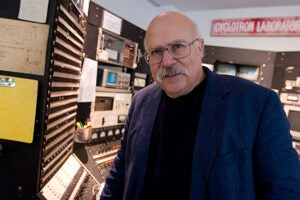
-
Campus & Community
Funding the next generation of scholars
Twenty undergraduates from around the world will have the chance to get hands-on experience in Harvard labs this summer, thanks to a four-year renewable grant to expand the Amgen Scholars Program to the University.
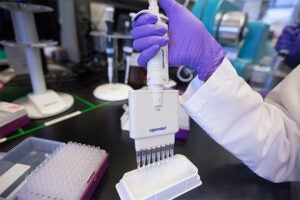
-
Health
Rapid-fire evolution
Faced with stiff competition from an invading species, a Harvard study has found that green anoles evolved larger toe pads equipped with more sticky scales to allow for better climbing in just 20 generations over 15 years.
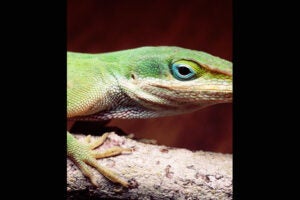
-
Health
Toward genetic editing
Led by David Liu, professor of chemistry and chemical biology, a team of Harvard researchers developed a system that uses commercially available molecules called cationic lipids to deliver genome-editing proteins into cells.
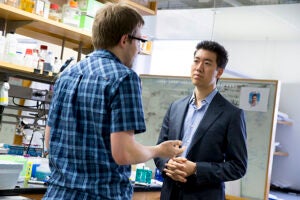
-
Campus & Community
Funding for projects with promise
Four scientists from across Harvard will receive nearly $8 million in grant funding through the National Institutes of Health’s High Risk-High Reward program to support research into a variety of biomedical questions, ranging from how the bacterial cell wall is constructed to how the blood-brain barrier works.
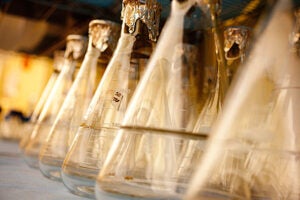
-
Health
Study of lizards shows trade as a force in biodiversity
New research shows that trade is one of the major drivers of biodiversity among lizard species in the Caribbean islands.
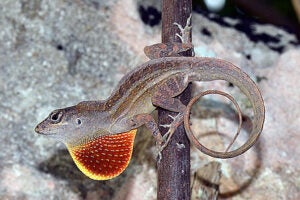
-
Health
All goes swimmingly
Using simple hydrodynamics, a team of Harvard researchers was able to show that a handful of principles govern how virtually every animal — from the tiniest fish to birds to the largest whales — propel themselves through the water.
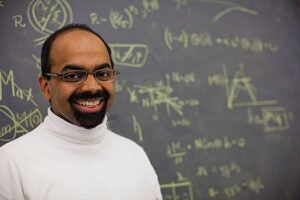
-
Science & Tech
Magnetic attraction
Harvard scientists have developed a system for using magnetic levitation technology to manipulate nonmagnetic materials, potentially enabling manufacturing with materials that are too fragile for traditional methods.
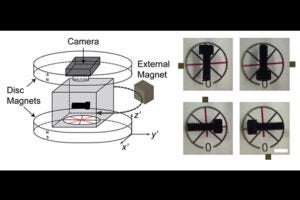
-
Health
From chance meeting, a chance to save lives
Harvard scientists have developed a new test for sickle cell disease that provides results in just 12 minutes and costs as little as 50 cents — far faster and cheaper than other tests.
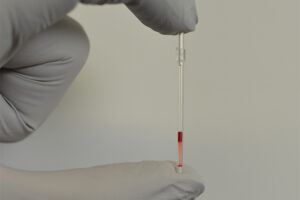
-
Health
When cooperation counts
A new study conducted by Harvard scientists shows that in deer mice, a species known to be highly promiscuous, sperm clump together to swim in a more linear fashion, increasing their chances of fertilization.
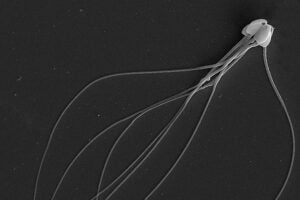
-
Science & Tech
Fighting unfairness
A new study by Harvard scientists suggests that, from a young age, children are biased in favor of their own social groups when they intervene in what they believe are unfair situations. But as they get older, they can learn to become more impartial.
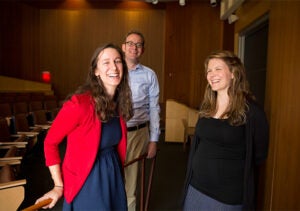
-
Campus & Community
Adam Cohen receives 2014 Blavatnik Award
Adam Cohen, professor of chemistry and chemical biology and of physics, has been named one of three winners of the 2014 Blavatnik National Awards, which honor young scientists and engineers who have demonstrated important insights in their respective fields and who show exceptional promise going forward.
